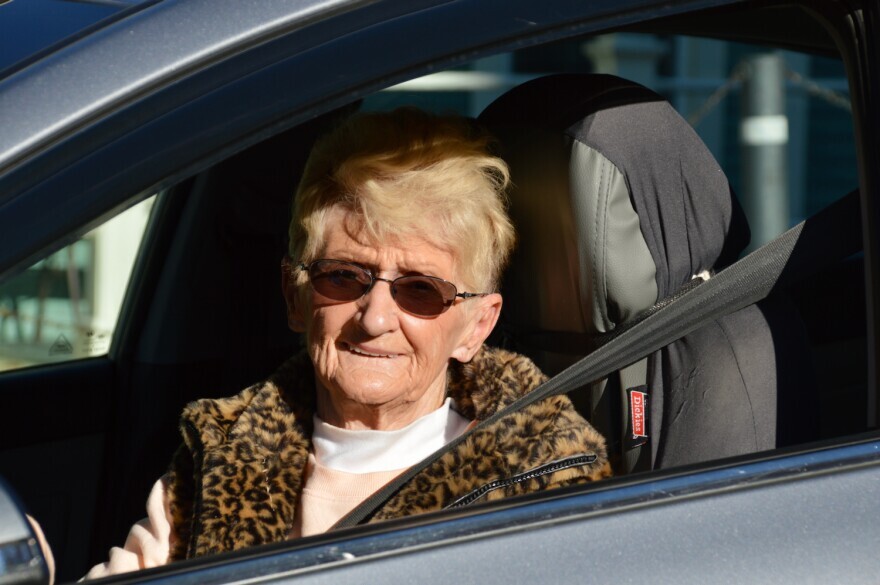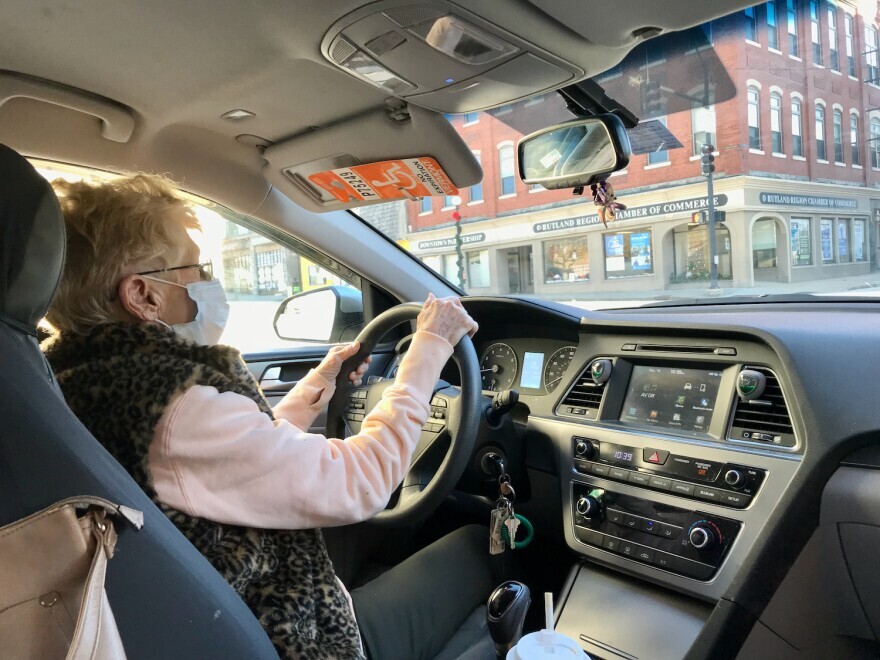These volunteer drivers help older Vermonters stay connected, even during the pandemic

Betty Rozell has been a volunteer driver with One2One in Rutland, Vt., for three years. The 84-year-old drives nearly every week day for the nonprofit, which helps people 60 and older who can’t drive themselves. “I like to stay busy,” Rozell says. “And it feels good to help.” (Nina Keck/VPR)
In Vermont, programs that help older residents get around when they can no longer drive are primarily paid for with Medicaid and federal grants.
But funding is limited, and most of these door-to-door ride services are only possible because of volunteer drivers — usually older Vermonters themselves. The pandemic has strained this model, but many volunteers have stayed behind the wheel, determined to help their neighbors stay connected.
Betty Rozell of Rutland, Vt., is one of them. Rozell was a waitress for years, and she says she likes to stay busy.
She does that by volunteering nearly five days a week with a program called One2One. The nonprofit provides free rides for residents of Rutland County who are 60 and older, and who can’t get around on their own.
Rozell drives a gray Hyundai, and she let me ride along with her back in early December, before the omicron variant was as prevalent as it is now. We met just after 8 a.m., well before her first client’s 8:30 medical appointment, and she mapped out her day.
“Well, we’re going to take him to the foot doctor,” Rozell said. “And I don’t know how long he’ll be there, so a lot of times he’ll have them call me if he’s going to be too late or something. And I’ll go to McDonald’s, get a coffee or something, you know, rather than go home and come back. Then I’ll sit in the parking lot wait for him. And then this afternoon, I have somebody else that goes to the beauty shop.”

Betty Rozell drives her gray Hyundai Sonata around Rutland, Vt., most every weekday, helping older neighbors who can’t otherwise get where they need to go. She does this work with One2One, a nonprofit that helps residents of Rutland County who are 60 and older. (Nina Keck/VPR)
Rozell is petite and stylish with short blondish-gray hair and a leopard-print fleece vest. As she flipped on her blinker and made her way through Rutland’s early morning traffic, she explained what she liked about driving.
“I enjoy the people,” Rozell said. “A lot of ’em are really quite pleasant. Once in a while you run into you know, problems like with wheelchairs or walkers that are heavy. I know that last week, I just had to tell them, ‘I can’t you know, I’m not young. I can’t be tugging on some of them.’”
Betty Rozell is 84, and older than many of her clients.
Across Vermont, the majority of the volunteer drivers who do this kind of work are retirees. VTrans doesn’t track their ages, but all go through extensive background checks.
Most use their own cars and earn a stipend of 56 cents per mile, which Rozell said does not cover her expenses: “No, not with the price of gas today, no.”
She pulled up in front of an older home with a sagging porch and we waited a few minutes. Eventually, an older gentleman made his way slowly down the sidewalk. He leaned heavily on his cane, and it took him a few minutes to get situated in the front seat.
“Good morning,” he told us both.
English is not this man’s first language, so conversation was difficult. But Rozell has driven him many times before, so they tried to fill the silence with small talk about the weather.
A few minutes later, she eased her car into a handicap space in front of a local doctor’s office, and her passenger made his way out.
He tried to ask if she was coming inside with him, but Rozell shook her head no. “I’ll be here when you’re done,” she told him. Then she repeated herself more loudly, “I’ll be here … I’ll come back.”
He nodded and thanked her before turning away, and Rozell watched to make sure he got inside.
